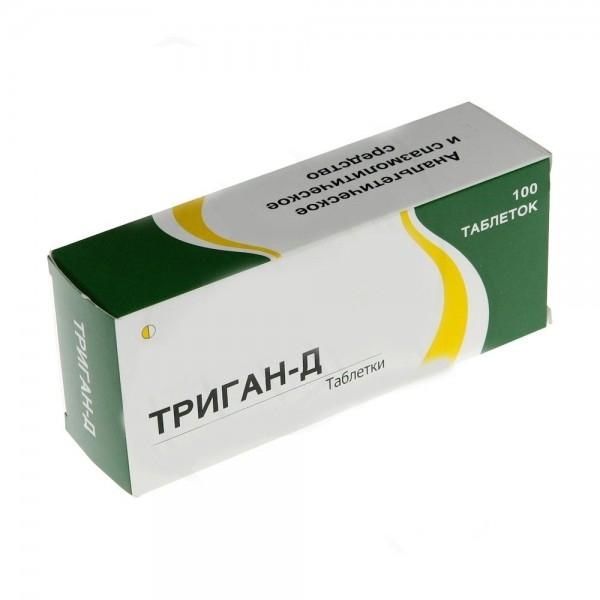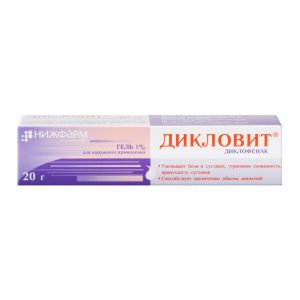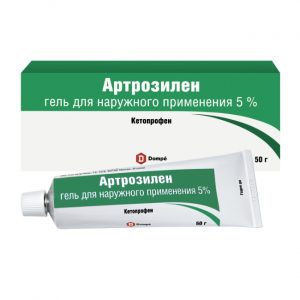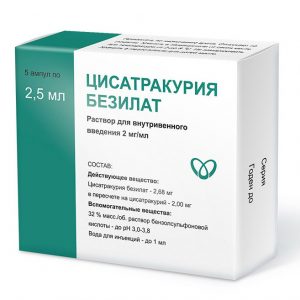Description
release form
tablets
packaging 100 pcs
Pharmacological action
Pharmacological action – antispasmodic, analgesic.
Paracetamol, which is part of the preparation, has analgesic, antipyretic and insignificant anti-inflammatory effects.
The mechanism of action is associated with moderate inhibition of cyclooxygenase-1 and, to a lesser extent, cyclooxygenase-2 in peripheral tissues and the central nervous system, the consequence of which is the inhibition of the biosynthesis of prostaglandins modulators of pain sensitivity, thermoregulation and inflammation.
The second component of dicycloverin hydrochloride is a tertiary amine, which has a relatively weak non-selective m-anticholinergic and direct myotropic antispasmodic effect on the smooth muscles of internal organs.
In therapeutic doses, it causes effective relaxation of smooth muscles, which is not accompanied by side effects characteristic of atropine.
The combined action of the two components of Trigan-D provides relaxation of the spasmodic smooth muscles of the internal organs and the weakening of pain.
Indications
Spasm of smooth muscle of internal organs.
Intestinal colic.
Hepatic colic.
Renal colic.
Algodismenorea.
Headache.
Toothache.
Migraine pain.
Neuralgia.
myalgia.
Infectious and inflammatory diseases accompanied by fever.
Contraindications
hypersensitivity to any of the components of Trigan-D
obstructive diseases of the gastrointestinal tract, hepatic and urinary tract ulcer disease bleeding
glaucoma
beast gravis
for children under 6 months of age
Use during pregnancy and lactation
Contraindicated in pregnancy and lactation.
Composition 1 tablet contains ditsikloverina hydrochloride 20 mg, paracetamol 500 mg
Dosage and administration
Applied orally.
Adults and children over 15 years of age: 1 tablet 2-3 times a day.
The maximum single dose for adults is – 2 tablets, daily 4 tablets.
Duration of admission without consulting a doctor is not more than 5 days when prescribed as an anesthetic and 3 days as an antipyretic.
With prolonged use of the drug, it is necessary to control the picture of peripheral blood and the functional state of the liver.
Do not exceed the daily dose: its increase or a longer treatment is possible only under medical supervision, as an overdose of the drug can cause liver failure.
Side effects
From the gastrointestinal tract
Dry mouth, loss of taste, loss of appetite, epigastric pain, constipation, increased activity of liver enzymes, usually without the development of jaundice, hepatonecrosis (dose-dependent effect).
Allergic reactions
Skin rash, itching, urticaria, Quincke’s edema, erythema multiforme exudative (including Stevens-Johnson syndrome), toxic epidermal necrolysis (Lyell’s syndrome).
With the central nervous system (usually develops when taking high doses)
Drowsiness, Dizziness, psychomotor agitation and disorientation.
From the endocrine system
Hypoglycemia, up to hypoglycemic coma.
Hematopoietic organs
Anemia, methemoglobinemia (cyanosis, shortness of breath, heart pain), hemolytic anemia (especially for patients with gluco-6-phosphate dehydrogenase deficiency).
From the genitourinary system
Pyuria, urinary retention, interstitial nephritis, papillary necrosis.
From the side of the organs of vision
Mydriasis blurred visual perception, paralysis of accommodation, increased intraocular pressure.
On the part of the reproductive system
Decreased potency.
Drug Interaction
The effect is amplified by amantadine, antipsychotic agents, benzodiazepines, MAO inhibitors, narcotic analgesics, nitrates and nitrites, sympathomimetics, tricyclic antidepressants, cholinolytic drugs, cholinolystitis
Increases the effects of digoxin.
Overdose
Symptoms: tachycardia, tachypnoea, fever, agitation, convulsions, epigastric pain, decreased appetite, anemia, thrombocytopenia, hemolytic anemia, aplastic anemia, methemoglobrocinemia, methemoglobrocinemia, methemoglobrocinemia
Treatment: stop taking the drug, do gastric lavage, appoint adsorbents, introduce agents that increase the formation of glutathione (acetylcysteine intravenously) and enhance conjugation reactions (methionine inward).
Storage conditions
In a dry, dark place at a temperature not exceeding 25 ° C
The Expiration of
is 3 years.
dosage form
dosage form
tablets




